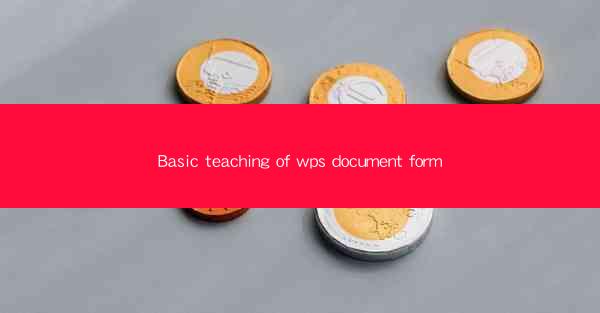
WPS Document, developed by Kingsoft Corporation, is a versatile word processor that has gained popularity in China and other Asian countries. It is a powerful alternative to Microsoft Word and offers a range of features that cater to both personal and professional users. This article aims to provide a basic teaching guide on how to use WPS Document effectively.
Understanding the User Interface
The first step in learning any software is to familiarize yourself with its user interface. WPS Document has a clean and intuitive interface that is similar to Microsoft Word. Here are some key elements to get started:
1. Menu Bar: This is where you will find all the main commands and options, such as File, Edit, View, Insert, and Format.
2. Ribbon: The ribbon is a set of tabs that contain related commands. For example, the Home tab contains basic formatting options, while the Insert tab allows you to add images, tables, and other objects.
3. Status Bar: The status bar at the bottom of the window provides information about the document, such as the page number, word count, and zoom level.
4. Document Area: This is where you will type and edit your text. It is also where you can view and manipulate the formatting of your document.
Creating a New Document
To create a new document in WPS Document, follow these steps:
1. Open WPS Document: Launch the application on your computer.
2. Click on New: In the File menu, click on New to create a new document.
3. Choose a Template: WPS Document offers a variety of templates to choose from, including resumes, letters, and reports. Select the one that best suits your needs.
4. Start Typing: Once you have selected a template, you can start typing your content directly into the document area.
Basic Formatting
Formatting your document is essential for readability and professionalism. Here are some basic formatting options in WPS Document:
1. Font: Change the font type, size, and style to suit your document's needs.
2. Paragraph: Adjust the alignment, spacing, and indentation of your paragraphs.
3. Bullets and Numbering: Use bullets and numbering to create lists and organize your content.
4. Styles: Apply predefined styles to quickly format your text, headings, and other elements.
5. Table of Contents: Generate a table of contents for longer documents to help readers navigate.
Inserting and Managing Objects
WPS Document allows you to insert various objects into your document to enhance its visual appeal and functionality:
1. Images: Insert images from your computer or online sources to illustrate your points.
2. Tables: Create tables to organize data and present information in a structured format.
3. Charts: Add charts to visualize data and make it more understandable.
4. Shapes: Use shapes to create diagrams and flowcharts.
5. Text Boxes: Insert text boxes to display text in a specific area of the document.
Collaboration and Sharing
WPS Document offers collaboration features that allow multiple users to work on the same document simultaneously:
1. Track Changes: Enable track changes to see who made what changes and when.
2. Comments: Add comments to discuss specific sections of the document with others.
3. Merge Documents: Combine multiple documents into one to create a comprehensive report.
4. Share: Share your document with others via email, cloud storage, or a direct link.
Advanced Features and Tips
Once you have mastered the basics, you can explore more advanced features in WPS Document:
1. Mail Merge: Use mail merge to create personalized documents, such as letters or envelopes, for a large number of recipients.
2. Macros: Record and run macros to automate repetitive tasks.
3. Templates: Customize and save your own templates for future use.
4. Accessibility: Ensure your documents are accessible to users with disabilities by using built-in accessibility features.
By following this basic teaching guide, you should be able to start using WPS Document effectively and efficiently. Remember to practice regularly and explore the software's features to enhance your productivity and creativity.











